
The number of newborns in Japan is decreasing faster than projected, with the number of annual births falling to a record low last year, according to government data released Wednesday.

The number of newborns in Japan is decreasing faster than projected, with the number of annual births falling to a record low last year, according to government data released Wednesday.
On Tuesday, classic computer collector Joe Strosnider announced the availability of a new 3D-printer filament that replicates the iconic "Platinum" color scheme used in classic Macintosh computers from the late 1980s through the 1990s. The PLA filament (PLA is short for polylactic acid) allows hobbyists to 3D-print nostalgic novelties, replacement parts, and accessories that match the original color of vintage Apple computers.
Hobbyists commonly feed this type of filament into commercial desktop 3D printers, which heat the plastic and extrude it in a computer-controlled way to fabricate new plastic parts.
The Platinum color, which Apple used in its desktop and portable computer lines starting with the Apple IIgs in 1986, has become synonymous with a distinctive era of classic Macintosh aesthetic. Over time, original Macintosh plastics have become brittle and discolored with age, so matching the "original" color can be a somewhat challenging and subjective experience.
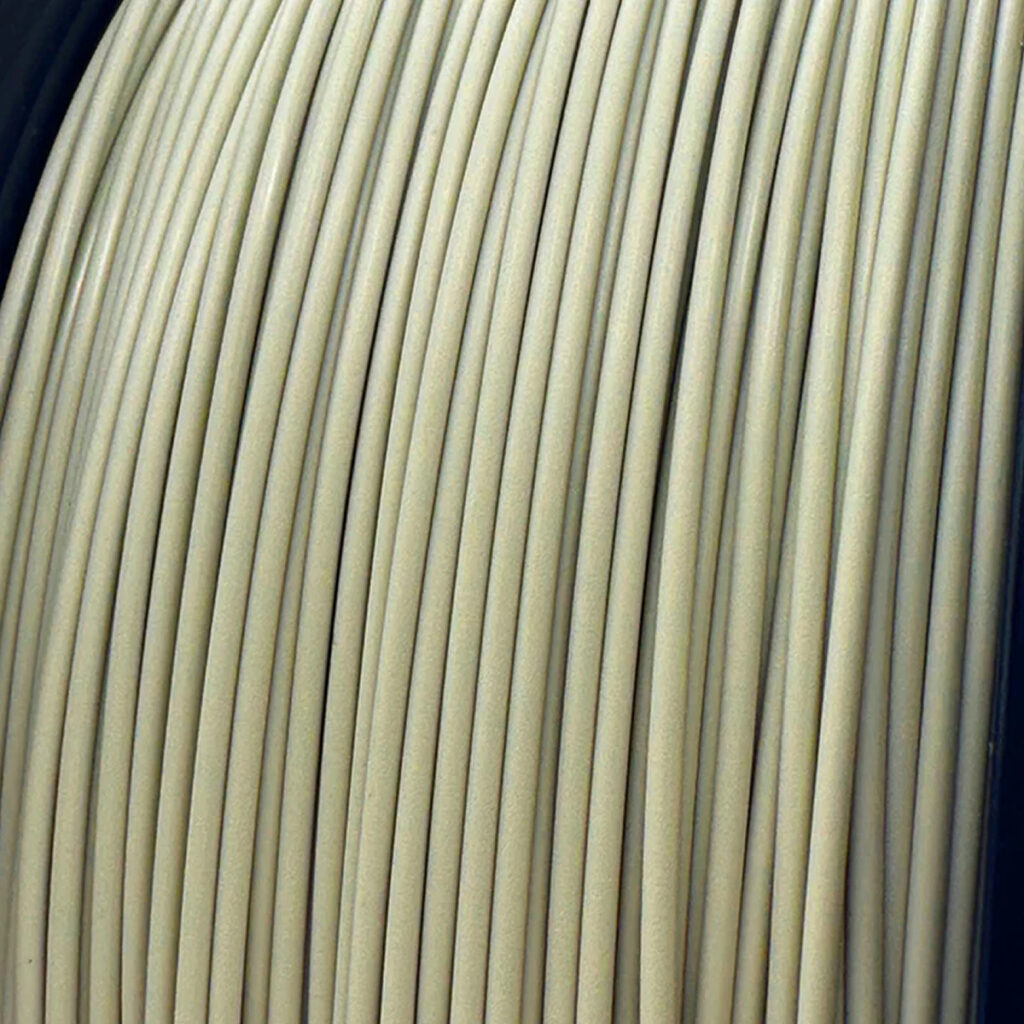 A close-up of "Retro Platinum" PLA filament by Polar Filament.
Credit:
Polar Filament
A close-up of "Retro Platinum" PLA filament by Polar Filament.
Credit:
Polar Filament
Strosnider, who runs a website about his extensive vintage computer collection in Ohio, worked for years to color-match the distinctive beige-gray hue of the Macintosh Platinum scheme, resulting in a spool of hobby-ready plastic by Polar Filament and priced at $21.99 per kilogram.
According to a forum post, Strosnider paid approximately $900 to develop the color and purchase an initial 25-kilogram supply of the filament. Rather than keeping the formulation proprietary, he arranged for Polar Filament to make the color publicly available.
"I paid them a fee to color match the speaker box from inside my Mac Color Classic," Strosnider wrote in a Tinkerdifferent forum post on Tuesday. "In exchange, I asked them to release the color to the public so anyone can use it."
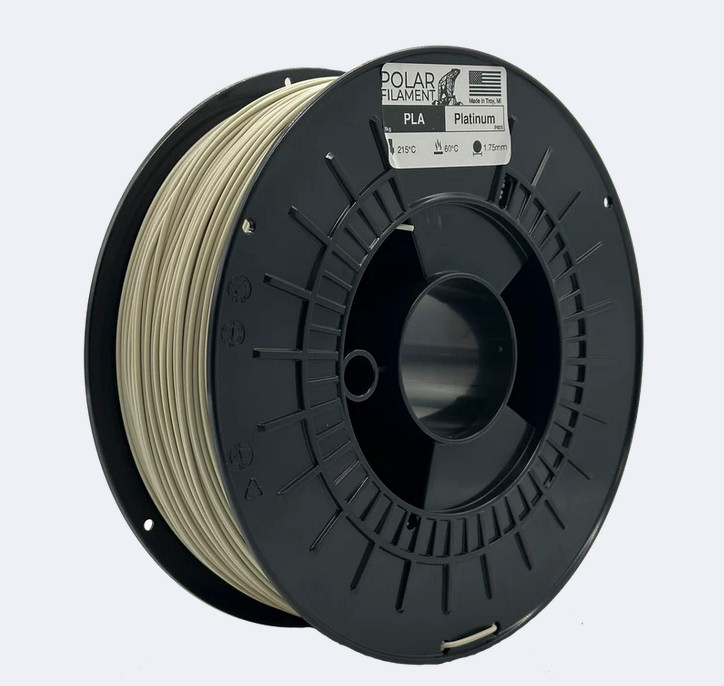 A spool of "Retro Platinum" PLA filament by Polar Filament.
Credit:
Polar Filament
A spool of "Retro Platinum" PLA filament by Polar Filament.
Credit:
Polar Filament
The development addresses a gap in the vintage computing community, where enthusiasts sometimes struggle to find appropriately colored materials for restoration projects and new accessories. The new filament is an attempt to replace previous options that were either expensive, required international shipping, or had consistency issues that Strosnider described as "chalky."
The 1.75 mm filament works with standard 3D printers and is compatible with automated material systems used in some newer printer models. On Bluesky, Strosnider encouraged buyers to "order plenty, and let them know you want them to print it forever" to ensure continued production of the specialty color.
The timing of the filament's release coincides with growing interest in 3D-printed cases and accessories for vintage computer hardware. One example is the SE Mini desktop case, a project by "GutBomb" that transforms Macintosh SE and SE/30 logic boards into compact desktop computers that can connect to modern displays. The case, designed to be 3D-printed in multiple pieces and assembled, represents the type of project that benefits from color-accurate filament.
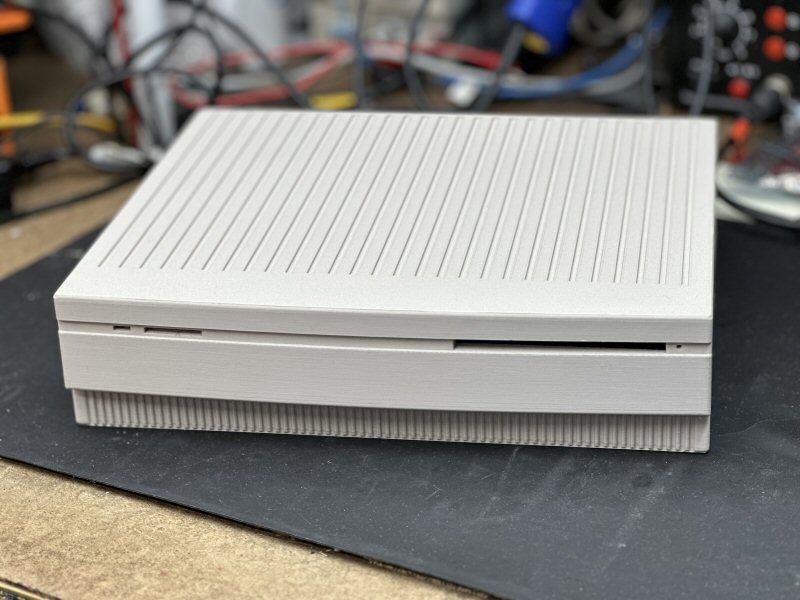 A 3D-printed "SE Mini" desktop case that allows using a vintage compact Mac board in a new enclosure.
Credit:
Joe Strosnider
A 3D-printed "SE Mini" desktop case that allows using a vintage compact Mac board in a new enclosure.
Credit:
Joe Strosnider
The SE Mini case requires approximately half a spool of filament and takes a couple of days to print on consumer 3D printers. Users can outfit the case with modern components, such as Pico PSUs and BlueSCSI storage devices, while maintaining the classic Macintosh appearance.
Why create new "retro" devices? Because it's fun, and it's a great way to merge technology's past with the benefits of recent tech developments. Projects like the Platinum PLA filament, the SE Mini case, and the dedication of hobbyists like Strosnider ensure that appreciation for Apple's computers of yore will continue for decades.
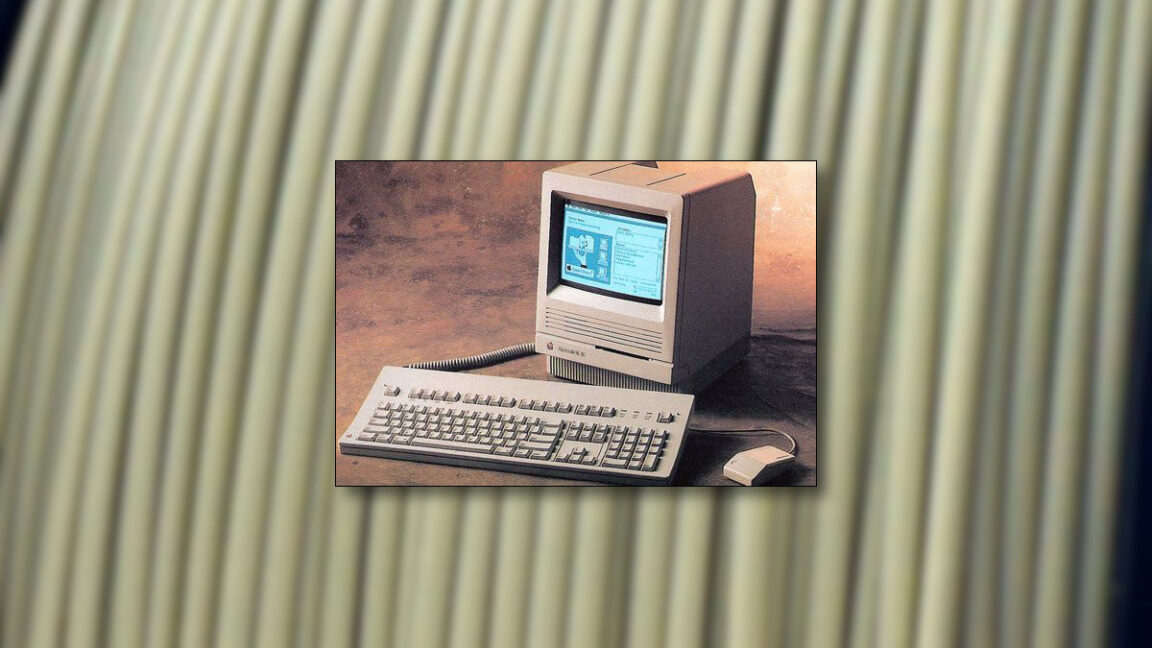
Many Arsians are the go-to IT support representative for family and friends. If you're lucky, your loved ones' problems are easily resolved with a reset, update, or new cable. That wasn't the case for a son who recently had to break the news to his father that the 20TB portable hard drive he purchased for about $40 was mostly just a plastic box with weights and a PCB.
Ars Technica spoke with the Reddit user who posted about his father bringing him a "new 20T[B] HDD to see if I could figure out what was wrong with it." The Redditor, who asked that we refer to him by his first name, Martin, revealed that his dad paid £38 (about $51.33) for what he thought was a portable HDD. That's a red flag. HDDs have gotten cheaper over the years, but not that cheap. A 20TB external HDD typically costs over $200, and they’re usually much larger than the portable-SSD-sized device that Martin’s father received. A 20TB HDD in a portable form factor is rarer and can cost well over $300.
Taking a hammer to the device revealed that the chassis was nearly empty, save for some iron wheel weights sloppily attached to the black plastic with hefty globs of glue and a small PCB with some form of flash storage that could connect to a system via USB-A.
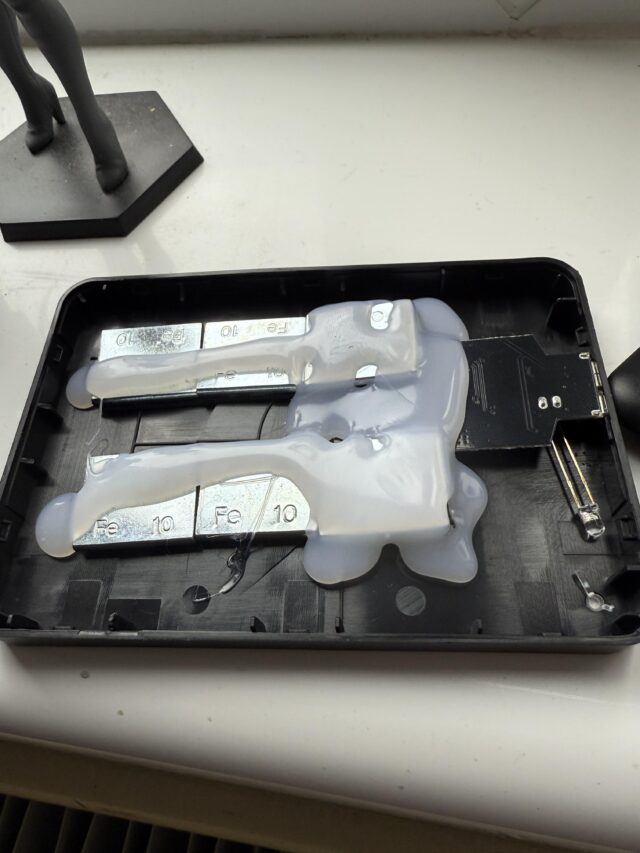 The "HDD" opened up.
Credit:
The__Unflushable/Reddit
The "HDD" opened up.
Credit:
The__Unflushable/Reddit
As with other PC storage scams we’ve seen online, Windows read the so-called HDD as a “19TB drive, but would then just hang if you try to do anything with it,” Martin said on Reddit.
Programming the board’s firmware so that the drive appears as a high-capacity storage device on Windows is a clever trick that could convince users they're to blame. But as Windows-savvy users would point out, Windows reports drive capacities in gibibytes or tebibytes, so a real 20TB HDD would appear as approximately 18.2TB in Windows.
Martin told Ars:
The device appeared to mount on the desktop with the device name in Mandarin (turned out this simply said “Hard Disc”). I tried copying a file, and the name did appear on the “hard disc.” It was only when I tried to open this file from the hard disc that the problems began to emerge. The file could not be opened, no matter how hard I tried, including reformatting the hard disc. At that point nothing was “working” at all.
Martin told Ars that his father purchased the fake HDD from a website called UK.Chicntech, which appears to primarily sell car supplies, kitchen supplies, and home textiles. Currently, the website does not list any PC components or peripherals, but overall, its stock is pretty limited. Chicntech currently lists some other electronics, like a “[With Starry Sky Lid]AI Nano Mist Intelligent Car Aromatherapy Device” (linking for explanatory purposes only; we don’t recommend shopping on this website) for $56.
Ars reviewed a receipt of the purchase from Chicntech, and others online have also reported seeing the website selling inexplicably cheap 20TB portable hard drives. In February, for example, a Twitter user shared a screenshot of what appears to be a Chicntech listing for an “External high -speed mobile hard disk” for £38; you could even get two for £56. The listing shown in the screenshot looks similar to the information in the receipt that Martin provided to Ars. Neither the listing in the screenshot nor the receipt Ars reviewed includes a brand name.
 A Twitter user shared this apparent screenshot of a Chicntech listing.
Credit:
DanPott99779297/Twitter
A Twitter user shared this apparent screenshot of a Chicntech listing.
Credit:
DanPott99779297/Twitter
Martin’s father received the device in a box with Toshiba Canvio branding (pictured at the top of this article). A Toshiba sticker is on the device’s backside. This is another red flag, as Toshiba’s website says its Canvio portable HDDs only go up to 4TB.
“Within this box there was a leaflet explaining how to reformat the disc drive,” Martin said.
Martin told Ars that Chicntech hasn’t refunded his father. He said that despite showing the site photographs of the box and the device’s insides, support representatives “repeated refusals to acknowledge there was problem” and “repeated requests for information I had already sent them.” Martin added:
At one point I was told that the car wheel weights “did not affect the performance of the device."
Chicntech’s best offer was a 30 percent refund, an offer to keep the sham device, and a “free gift” from the UK version of a Japanese website, Cacogoga, Martin said . Examining Chicntech and Cacogoga’s websites didn’t reveal any obvious connections between the sites. Ars reached out to both companies for comment but has not received a response.
Chicntech's returns and exchanges policy is a red flag in itself, featuring confusing language and unclear language. The policy reads, in part:
We hope you enjoy what you ordered! But in case you're not 100% satisfied, we've made the return process super easy.
1.The product itself has quality problems…
The policy also states:
The following conditions do not apply to 7 days no reason to return: …
2.The product has been used (the electronic product is considered to have been used once it is energized)…
Martin’s father’s experience is common in a world of online shopping, consumer electronics that many users don’t fully understand, and bargain hunting. Fraudulent storage devices in particular have become common.
For tech enthusiasts, this incident was riddled with warning signs, starting with the dubious website. But shoppers have also discovered counterfeit tech devices, including storage components, from well-known companies, including Walmart and Amazon. Online marketplaces where individuals can create seller profiles to push fraudulent products are particularly concerning.
Outside of online marketplaces, Micro Center recently found itself at the center of a GPU scam after a customer opened a box for a purchased Zotac Gaming GeForce RTX 5090 Solid OC, only to find backpacks. On Reddit, the person said that Micro Center reported finding another 31 Zotac GPU boxes filled with backpacks. As Tom’s Hardware pointed out, the Zotac box that the Redditor opened was reportedly factory-sealed, suggesting that the heist happened higher in the supply chain.
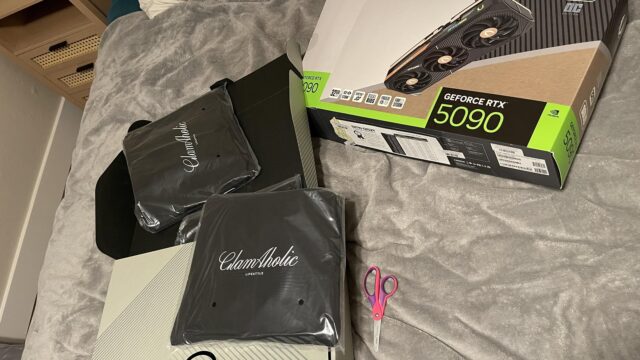 A Redditor said they received this box of backpacks instead of a GPU.
Credit:
JamesFerg650/Reddit
A Redditor said they received this box of backpacks instead of a GPU.
Credit:
JamesFerg650/Reddit
Micro Center reportedly replaced the customer’s backpacks with a real RTX 5090.
If you have loved ones relying on your technical knowledge, now is a good time to remind them that it's best to stick to known retailers with sensible refund policies and to price check against multiple retailers for an understanding of realistic pricing.
Martin said his father is currently seeking a refund through his credit card company.
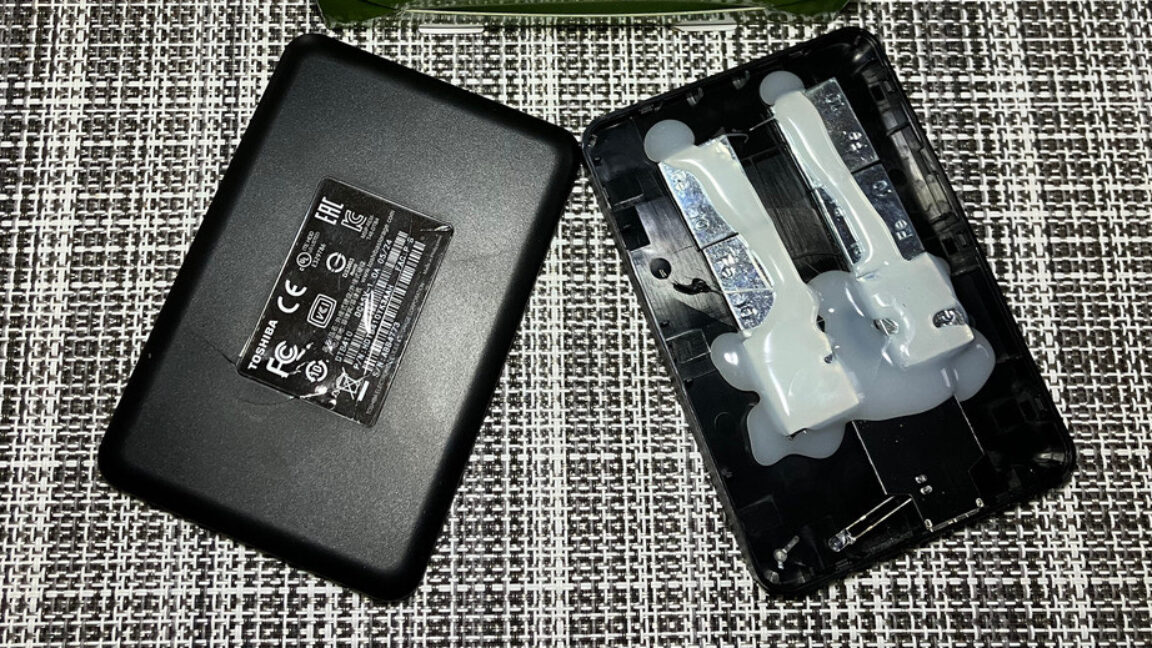
Once hailed as a triumph of public health, water fluoridation is now under intense attack in the US.
Despite decades of data proving its efficacy at protecting teeth from decay—particularly children's teeth—two states have now banned the use of fluoride in public water, and communities around the country have followed suit or are considering doing the same. The current US health secretary, Robert F. Kennedy Jr., who is known for his anti-vaccine advocacy and for peddling conspiracy theories, has pledged to remove fluoride from US water.
Now, a pair of researchers at Harvard—Sung Eun Choi and Lisa Simon—have modeled exactly what will happen in the US if Kennedy follows through on his pledge: The number of cavities and decayed teeth in American children and teens (ages 0–19) will increase by an estimated 7.5 percentage points over the first five years. That means there will be 25.4 million more rotten teeth in the mouths of children and teenagers. The dental bills for the added decay will total at least $9.8 billion in that time. Other costs, such as loss of work among parents, were not included, making the financial estimate conservative. But children will also be more miserable, with an estimated loss of 2.9 million quality-adjusted life years.
